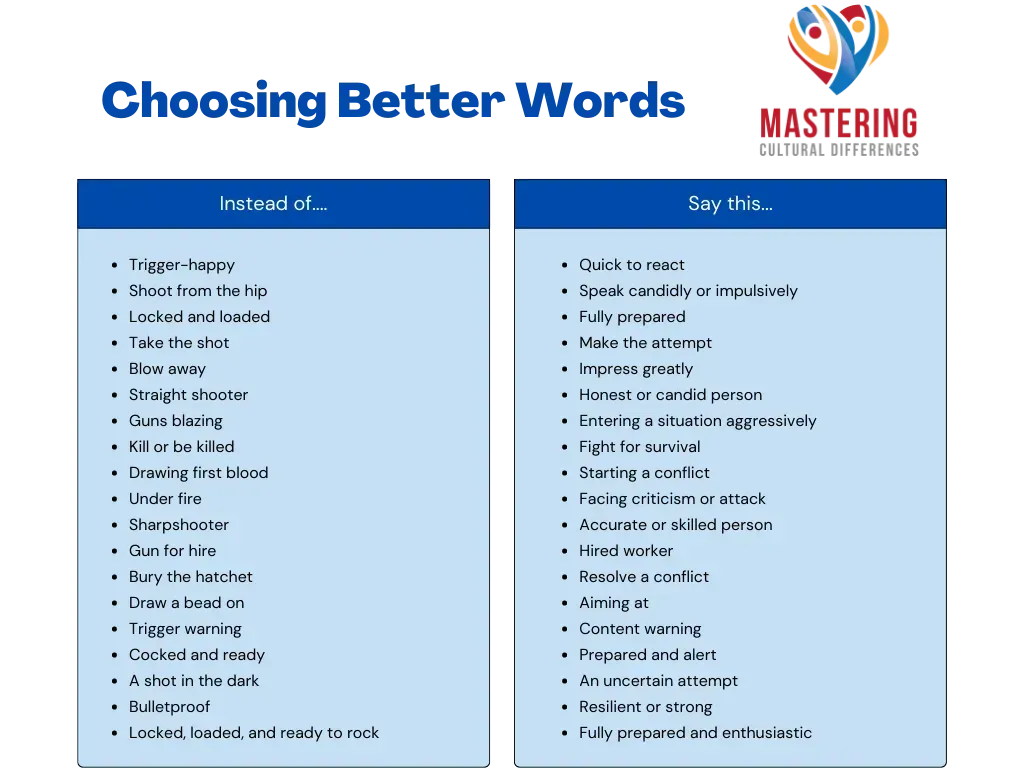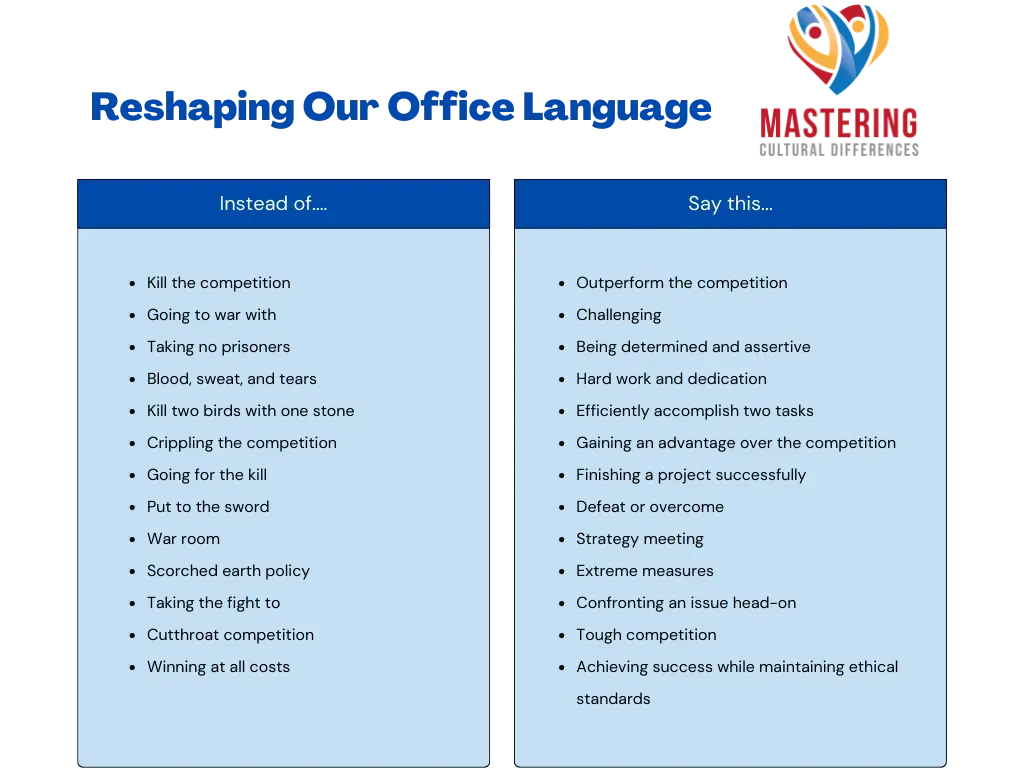The Power of Words: Recognizing the Alarming Normalization of Violent Language
There is no denying that words can inspire, unite, and foster understanding; but they can also divide, hurt, and leave lasting scars.
Regrettably, our society is witnessing a deeply concerning trend: the alarming normalization of violent language. Whether in casual conversations, online interactions, in the media and even around the office, expressions containing some form of violence have become commonplace.
The use of violent language and phrases like "kill two birds with one stone," and “bite the bullet,” may seem innocuous on the surface. In fact, they are commonly employed in everyday conversation without malicious intent.
Over time, though, these expressions contribute to the desensitization of violence in our society. By casually employing such phrases, we inadvertently normalize violent imagery and concepts, making acts of harm or aggression appear commonplace or even acceptable.
this desensitization can lead to indifference to the true consequences of violence, and potentially numb our emotional response to real-life instances of harm. To foster a more empathetic society, it is essential to recognize the impact of our words and strive for language that promotes understanding, respect, and non-violence.
Why is Violent Language so Prevalent?
Frequently, when seeking to communicate intense emotions like anger, frustration, or passion, we may instinctively turn to violent language as a means to express ourselves forcefully and make a strong statement. Nevertheless, this approach is misguided and may not effectively convey the intended message.
The pervasive normalization of violent language in our daily vocabularies is a complex issue influenced by a multitude of cultural, societal, and technological factors.
Take for example the media portrayals of different groups. The media, including movies, television shows, video games, and news outlets, play a pivotal role in shaping public discourse and language trends. The overplay of violence in various forms of media has desensitized audiences and society to the use of violent language, making it appear commonplace and less alarming.
The rise of technology, particularly social media and online platforms has significantly altered how we communicate. Social media platforms often reward sensationalism and provoke emotional responses, leading to the proliferation of violent language for shock value and attention-seeking. The ease of disseminating information online means that violent language can quickly become viral and influence a larger audience, contributing to its normalization.
In addition, in-group and out-group dynamics can also contribute to the normalization of violent language as a form of social bonding or tribalism. People may use aggressive language to reinforce their group identity or to create a sense of unity within their community. Simultaneously, violent or derogatory language may be directed towards perceived out-groups as a means of dehumanizing or marginalizing them.
Take for example the words used to describe immigrants and asylum seekers in this country. The use of dehumanizing language to describe them is deeply concerning and can perpetuate harmful stereotypes, discrimination, and xenophobia.
Instead of recognizing their humanity and dignity, these individuals are often labeled as "illegal aliens," "criminals," or "invaders," which not only misrepresents their complex situations but also fosters an environment of hostility and fear.
Needless to say, it is crucial to promote respectful and empathetic language when discussing immigration issues, as it plays a vital role in shaping public perception and shaping inclusive policies that uphold human rights for all.
Say This, Instead of That
I would like to invite you to embark on a journey to reshape your language for the better.
In a world inundated with violence and aggression, we often underestimate the profound impact our words can have on others and ourselves.
By making conscious choices to replace violent language with kinder alternatives, we not only foster a more compassionate and understanding society but also empower ourselves to communicate more effectively.
Below, we explore simple yet powerful swaps, which can transform our everyday expressions from forceful to respectful. Here are 19 gun-related or violence-related phrases and their alternatives:

From Violence to Value: Reshaping Our Office Language
While we may not brandish weapons in our workplace, it's surprising how often we unconsciously use violent language in our daily interactions. From meetings to emails, aggressive expressions can subtly seep into our conversations, inadvertently creating an unwelcome atmosphere.
Below, you will find some common violent phrases that may be lurking around your office as well as alternatives that promote a culture of respect, collaboration, and understanding.

Final Thoughts
The use of violent language has become all too common in our daily interactions, and its impact on society, and even the workplace, cannot be ignored.
As we've explored the various factors contributing to this alarming normalization, it is evident that our words hold immense power in shaping our perceptions and attitudes.
However, we have the agency to change this narrative. By recognizing the consequences of violent language and actively choosing alternative, respectful expressions, we can set in motion a profound transformation in our social fabric.
Let us strive to foster an environment of empathy, understanding, and cooperation, where the language we use reflects our shared commitment to building a more compassionate and harmonious world.
Each conversation, each interaction, is an opportunity to inspire positive change, and together, we can create a ripple effect that extends far beyond our immediate circles, shaping a society built on words that uplift, connect, and truly value each other.
Subscribe to The DEI+ Newsletter!
Sign up to get weekly tips and strategies about diversity, equity, and inclusion to help you increase your DEI IQ. Emails are guaranteed short and to the point!

